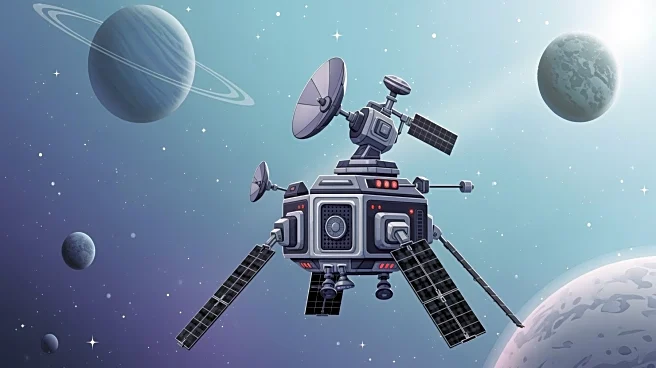What's Happening?
NASA, in collaboration with the University of California, Berkeley's Space Sciences Laboratory, is set to launch the ESCAPADE mission to Mars. This mission aims to explore why Mars lost its thick atmosphere, which once supported flowing water, and what
this could mean for Earth. The mission involves two identical spacecraft, named Gold and Blue, which will orbit Mars to provide a 3D view of its magnetosphere and upper atmosphere. The launch is scheduled for Sunday from Kennedy Space Center in Florida, using Blue Origin's New Glenn rocket. The mission will take a unique route, first traveling to a Lagrange point before heading to Mars, allowing for flexible launch schedules. This mission is part of NASA's efforts to understand the interaction between solar wind energy and Mars' atmosphere, which could provide insights into protecting Earth's climate and atmosphere.
Why It's Important?
The ESCAPADE mission is significant as it seeks to uncover the reasons behind Mars' atmospheric loss, which could offer critical insights into Earth's atmospheric and climate stability. Understanding Mars' atmospheric history can help scientists develop strategies to protect Earth's atmosphere from solar threats. The mission also holds importance for future human exploration of Mars, as it aims to map the planet's magnetic fields and assess space weather impacts, which are crucial for safeguarding astronauts from solar and cosmic radiation. Additionally, the mission is a cost-effective endeavor, demonstrating the feasibility of conducting high-value scientific missions on a limited budget, which is crucial given NASA's potential budget constraints.
What's Next?
Once launched, the twin probes are expected to reach Mars by 2027. They will work in tandem to provide real-time data on how Mars' atmosphere interacts with solar winds. This data will be vital for future Mars missions, particularly those involving human exploration. The mission's findings could influence NASA's strategies for protecting astronauts from space weather and contribute to broader scientific understanding of planetary atmospheres. The success of this mission could also pave the way for more cost-effective space exploration missions in the future.
Beyond the Headlines
The ESCAPADE mission highlights the importance of international cooperation and innovation in space exploration. It underscores the need for continued investment in scientific research to understand planetary environments and their implications for Earth. The mission also raises awareness about the fragility of Earth's atmosphere and the potential risks posed by solar and cosmic phenomena. By studying Mars, scientists hope to gain a deeper appreciation of Earth's unique conditions and the factors that sustain life.















